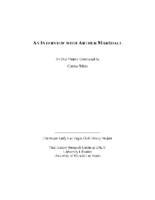Search the Special Collections and Archives Portal
Search Results

Transcript of interview with Jackie Boiman by Barbara Tabach, March 27, 2015
Date
Archival Collection
Description
Jackie, n?e Brooks, Boiman was born in Brooklyn and raised in Levittown, New York. Although Jackie recalls her family?s Jewish observance as far less than strict, her religious connection began in the Levittown Jewish Center Sunday School and under the close relationship she had with her grandmother, who kept kosher and inspired her to do so. In her early twenties, Jackie worked in data reduction at Grumman Aerospace Corporation and the space program; was married and had her only child, Andee. After twelve years of marriage, Jackie divorced and relocated to Las Vegas, where her parents had moved earlier. In Las Vegas, job opportunities for a single mother were scant. Then after months of searching, she found her first job as a part time secretary for Temple Beth Sholom. Over the course of the next nearly fifteen years, Jackie would go on to work with almost every congregation and temple in Las Vegas, developing their youth programs and contributing to the growth of each one for 15 years. After a brief retirement, she had gone back to work as the first administration person for Touro University. In this interview, Jackie discusses at length her involvement with each of the temples, her experiences with being a single mother and living below the poverty line. She shares how her life has been changed through trials and tribulations but how her faithfulness and commitment to her mission had led her to the success she has today.
Text

Transcript of interview with Lynn Leshgold Rosencrantz by Barbara Tabach, January 7, 2016
Date
Archival Collection
Description
In this interview, Rosencrantz discusses at length her involvement as a founder of the city?s Jewish Federation?s Young Leadership Program, including other local leaders she worked with to promote Jewish community engagement in Las Vegas. She also talks about her spiritual journey as an adult, leading to her participation at Stillpoint Center for Spiritual Development.
Text

Transcript of interview with John Wanderer by Barbara Tabach, May 9, 2016 and May 18, 2016
Date
Archival Collection
Description
In this interview, Wanderer talks about his first career in auto mechanics and car racing, which developed out of a childhood passion, and eventually took him to Charlotte, North Carolina working for Holman and Moody. He then discusses the decision to move back to Las Vegas with wife, Dorothy (Dottie), to pursue his legal career. Wanderer reflects at length about his mother?s trailblazing legal career, and working with her as legal partners. In addition, Wanderer discusses politics, including his observations from the 2016 Democratic State Convention and running for Democratic Party National Committeeman.
Text

Transcript of interview with Suzie Chenin by Barbara Tabach, September 29, 2015
Date
Archival Collection
Description
In this interview, Suzie discusses growing up in Las Vegas, with a strong community of friends, particularly within Temple Beth Sholom. She also talks about her real estate career, both in residential and commercial properties, highlighting some of the successes and challenges. She describes her working relationship with Milton Schwartz, as well her time working with the Greenspuns while selling advertising at the Las Vegas Sun.
Suzie Chenin was born in Cleveland, Ohio, in August of 1949. The next year, her parents, Joseph and Irene Chenin, moved the family to Las Vegas. Her father, a dentist, was stationed at Nellis Air Force Base, becoming the first Jewish dentist in the state ? and only the thirtieth overall. After graduating from Las Vegas High School, Suzie attended Arizona State University. However, she quit school and moved to Los Angeles where she got a job with a large real estate developer. This was her first foray into the industry. A few years later, back in Las Vegas, Suzie got her real estate license, eventually starting her own brokerage firm, Chenin and Associates.
Text

Transcript of interview with Todd S. Polikoff by Barbara Tabach, August 30, 2016
Date
Archival Collection
Description
In 2015, Todd S. Polikoff was named the President & Chief Executive Officer of the Jewish Federation of Las Vegas. (The organization is now known as Jewish Nevada). Todd is a graduate of Stockton University and earned his MBA at Cleveland State University. He has three children: Samuel, Shira and Jordan. Born in 1971 to a steelworker and hairdresser, Jack and Judy Polikoff, Todd grew up in Philadelphia, became a bar mitzvah there, and shocked his mother when he explained he was putting college on hold to move to Israel. In addition to stories about these life memories, Todd also traces his career path to decision-making to a meaningful trip to Moscow a where a defining moment helped him understand his own relationship with Judaism. To the time of this interview, Todd has invested over twenty years in leadership of Jewish Federation and AIPAC in states that include New Jersey, Delaware, Texas, Ohio and Nevada.
Text

Transcript of interview with Arthur "Art" Marshall by Claytee D. White, February 11, 2014
Date
Archival Collection
Description
Interview with Arthur "Art" Marshall by Claytee White on February 11, 2014. In this interview, Marshall
Arthur Marshall was born in 1929 in Cleveland, Ohio. He met his wife, Jayn in 1953, and the couple moved to Las Vegas where she already lived with her family. Art joined his father-in-law in the family's retail clothing business. Art Marshall took over the retail clothing business with his brother-in-law, Herb Rousso, and expanded operations as Marshall-Rousso stores. Art quickly became very active in the Jewish community upon arriving in Las Vegas. He served as president at Temple Beth Sholom, and worked with other Jews in the city, many who owned and managed the hotels at the time, to build a strong Jewish community in Las Vegas. He served as the chairman of Nevada State Bank and spent 12 years on the Nevada Gaming Commission.
Text

Transcript of interview with Irwin Molasky by David G. Schwartz, April 23, 2014
Date
Archival Collection
Description
Interview with Irwin Molasky by David G. Schwartz, April 23, 2014. In this interview, Irwin Molasky discusses arriving in Las Vegas in the 1950s, and building the Pyramids motel on the Strip. He talks about the entertainers in various hotels on the Strip, the concept of the "star policy," and bringing Parisian shows to Las Vegas. He goes on to discuss his real estate developments, including Paradise Palms, Boulevard Mall, and Sunrise Hospital, and donating the land for the development of UNLV.
Irwin Molasky came to Las Vegas in 1951, during a time when "everyone knew everyone else," and there was a small, but strong Jewish community. An Army veteran, Irwin and his wife moved to Las Vegas after living in California for a short time. Irwin soon built The Pyramids, a Strip motel next to the Flamingo Hotel and Casino. The Pyramids opened the same day as its northern next-door neighbor, The Sands Hotel and Casino, on December 15, 1952. Irwin used his newly acquired contractor's license to become on the city's most important real estate developers. Over the next 60 years, he built everything from residential housing, including Paradise Palms to commercial properties. Projects included Sunrise Hospital and the surrounding medical buildings; Sunrise City Shopping Center and other power centers; Bank of America Plaza and much other downtown development; and golf courses. When the recession hit, Irwin began bidding on government projects across the country, successfully shielding his business and employees from the economic downturn. Irwin's real estate ventures not only had a tremendous impact on Las Vegas' economic development, but a substantial effect in social programming. Irwin donated 40 acres of prime real estate to the University of Nevada - Las Vegas (UNLV) so that university could expand. Additionally, he was the Founding Chairman of the UNLV Foundation and received an honorary doctorate in humanities.
Text

Transcript of interview with Michael S. Mack by Claytee White, May 21, 2009
Date
Archival Collection
Description
During this interview, Michael Mack visualizes his childhood memories of the later 1930s, when Las Vegas was a small, but steadily growing, desert town. As he says, "The desert was our backyard." The Strip hotels like the last Frontier and the Flamingo pop into the stories, but it was basically an innocent time. He attended John S. Park Elementary when classrooms were temporary buildings from the local Air Force base and the neighborhood was filled with children. He still maintains close friendships from that time. And he also recalls friends from the Westside neighborhood. Michael talks of scouting, riding horses, and watching Helldorado parades.
Michael Mack's first recollection of Las Vegas is as a two-year-old living in a duplex on Bonneville Ave. Though the family moved several times, they remained in or near the John S. Park neighborhood. Michael's father was a Polish immigrant who arrived in Boulder City, where he opened a shoe store, in 1932. The building of the Hoover Dam brought opportunities and his father Louis expanded into the salvage business. In time Louis moved the family to Las Vegas, opened a retail clothing store, which eventually sold uniforms, and set up the first local bail bondman office. During this interview, Michael visualizes his childhood memories of the later 1930s, when Las Vegas was a small, but steadily growing, desert town. As he says, "The desert was our backyard." The Strip hotels like the last Frontier and the Flamingo pop into the stories, but it was basically an innocent time. He attended John S. Park Elementary when classrooms were temporary buildings from the local Air Force base and the neighborhood was filled with children. He still maintains close friendships from that time. And he also recalls friends from the Westside neighborhood. Michael talks of scouting, riding horses, and watching Helldorado parades. Though the Macks were a Jewish family, Michael's mother always brought the Christmas tree to school. It was a period when people memorized each other's 3-digit phone numbers, went to movies for 14 cents, and there was a ranch for people to stay while getting divorced. Halloween Trick-or-treaters in the John S. Park neighborhood might get a tasty cupcake or a shiny dime. Michael has a plethora of stories about innocent mischief and the unique experiences of a boy growing up in Las Vegas.
Text

Transcript of interview with Burton Cohen by Claytee White, January 9, 2009
Date
Archival Collection
Description
In this interview, Burton Cohen discusses his involvement in the Las Vegas casino industry, including booking entertainment for various hotels.
Burton Cohen's long casino executive career began in the mid-1960s when he accepted a proposition to become involved with the transformation of the Frontier Hotel. He left his south Florida roots and law practice to become a co-owner/general manager of the Frontier Hotel. Thus, began his highly regarded Las Vegas presence. For nearly four decades he served in the management of some of the Strip's most famous casinos: Flamingo, Dunes, Circus Circus, Caesar Palace, Thunderbird and the Desert Inn, which remains his favorite. In this interview, Burt reflects on the positions he held, the celebrities he hired and befriended, and offers a unique look at the behind the scenes marketing and entertainment strategies that he helmed. He shares stories of becoming entrenched in casino operations, his reflections of union experiences, and even anecdotes about moving his mother to Las Vegas.
Text

Transcript of interview with Doris, Gerald and Marcy Welt by Barbara Tabach, November 30, 2014
Date
Archival Collection
Description
Interview with Doris, Gerald "Jerry", and Marcy Welt by Barbara Tabach on November 30, 2014. In this interview, the Welts discuss how they came to Las Vegas in the early 1970s from California, and Eli Welt's pawnshop, Stoney's, which he acquired from Doris's father, Jerry Fox. Jerry and Marcy talk about how they met and came to Las Vegas, where Jerry worked for Harry Reid's law firm. They talk about the community that existed in Las Vegas at the time, and their involvement with B'nai B'rith.
Just before the start of the Great Depression, Doris Fox was born in Detroit, Michigan. At the age of fifteen, she met Eli Welt, and the two were married three years later in Alexandria, Louisiana, where Eli was stationed with the United States Army Air Corps. Eventually, Doris and Eli moved to southern California with their three children-Gerald (aka Jerry), Richard (aka Rick) and Susan (aka Sue). In 1971, after all their children were out of the house, Doris and Eli moved to Las Vegas. They followed Doris' father, Jerry "Stoney" Fox, who had moved to the city in the 1940s, and was one of the first entrants into the local pawnshop industry. Like many migrants to the city, Eli became active in the Jewish community, particularly with B'nai Brith and Jewish Family Service Agency. Doris and Eli's eldest son, Jerry, and wife, Marcy, moved to Las Vegas in 1972 with their two small children. Tiffany and Cory. Jerry and Marcy had met through a Jewish youth group as teenagers in Anaheim, California. Having just finished law school, Jerry found that legal career opportunities were plentiful in the growing city. His first job was as a law clerk with Harry Reid's law office, Beckley, DeLanoy, Jemison and Reid, later becoming an associate attorney. He assisted Reid as lieutenant governor and on his early political campaigns. Jerry left Beckley, DeLanoy, Jemison and Reid to work for Oscar Goodman's firm-Goodman, Snyder and Gang-focusing on civil litigation. In 1975, Jerry opened his own practice, continuing to specialize in civil ligation, and served as general counsel to Las Vegas Clark County Library District. Since their arrival, Marcy and Jerry have been dedicated to community service, particularly within the Jewish community. Both were active in youth programs at Temple Beth Sholom, Jerry even serving as youth commissioner and later, education director. Marcy worked with Edythe Katz at the Holocaust Resource Center and assisted with producing a film and training program for educators. Both are avid supporters of youth travel to Israel and work hard to ensure these opportunities continue to be available for those interested.
Text
